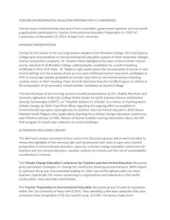TEACHER ENVIRONMENTAL EDUCATION PREPARATION IV CONFERENCE
Twenty-seven environmental educators from universities, government agencies and non-profit organizations participated in Teacher Environmental Education Preparation IV (TEEP IV) Conference on December 12, 2019, at New York University.
MORNING PRESENTATIONS
During the first phase of the morning session speakers from Brooklyn College, NYU and Queens College gave presentations on the environmental education aspects of their respective colleges' teacher preparation programs. Dr. Eleanor Miele highlighted the basic environmental science course required of all Brooklyn College undergraduate candidates for a preK-6 teaching certificate in New York State. Dr. Rebecca Light spoke about the incorporation of access to non-formal settings into the training of pre-service early childhood teacher education candidates at NYU to encourage teacher graduates to include class visits to non-formal venues including outdoor areas, in their teaching. Peter Schmidt described how the GLOBE Program is utilized in the preparation of all secondary school teacher candidates at Queens College.
The second phase of the morning session included presentations by Drs. Shakila Merchant and Tarendra Lakhankar of the City College NOAA Center for Earth Systems Science and Remote Sensing Technologies (CREST), on "Weather Stations in Schools" as a means of teaching about climate change; by EEAC Chair River DiLeo regarding the ongoing effort to establish an environmental education clearinghouse for teachers and non-formal educators; EEAC Board Member Sarah Pidgeon who spoke about planning for a climate change education conference; and Christine Johnson of DOE, Division of School Facilities sharing information about the NYC DOE program to install solar collectors on school buildings.
AFTERNOON DISCUSSION GROUPS
The afternoon session consisted of four concurrent discussion groups which were intended to review the highlights of the morning talks and recommend next steps in each area: teacher preparation in environmental education, plans for a climate change education conference for teachers and non-formal educators, weather stations for schools and the role of sustainability coordinators in schools.
The Climate Change Education Conference for Teachers and Non-formal Educators discussion group developed strategies for moving the conference planning process forward. With respect to outreach the group recommended looking for other non-profit partners who can reach teachers. Specifically this means connecting to organizations and individuals in the health, social justice, civics and after-school fields.
The Teacher Preparation in Environmental Education discussion group focused on expansion within the City University of New York (CUNY). They identified a few basic obstacles that have prevented more integration of EE into teacher prep. at CUNY. The group made some recommendations such as institutionalizing EE and sustainability courses and programs by making sure they are in the course bulletin and school program descriptions; inviting CUNY faculty and their deans to present at conferences and symposia; and presenting at the Climate Change Education Conference in 2021.
The Weather Stations in Schools discussion group reviewed the current status of weather stations in schools and how much future expansion is realistic. Twenty weather stations in schools have been installed across the 5 boroughs of NYC, 19 of which are feeding data to the CUNY server at the CREST Institute at City College. CUNY CREST plans to install additional sites including on Staten Island and Long Island. There is also a need to create teacher ambassadors and leaders who can train incoming teachers to the program and expand the knowledge and pedagogy/curriculum on weather stations and climate. Dedicated instructors and curriculum developers need to be identified to create instructional designs in line with academic standards with a focus on Earth System Sciences and environmental engineering.
The main takeaway from the Sustainability Coordinator discussion group is that the DOE Office of Sustainability will continue to offer and enrich a plethora of support opportunities to sustainability coordinators such as the sustainability project grant, sustainability mentorship program and the Sustainability, Efficiency and Environment Dedication (S.E.E.D.) Certification, which guides schools through action access categories that support measurable progress in sustainability. Schools work towards bronze, silver and gold certificates and DOE recognition. EEAC will support those efforts in any manner possible.
Overall the Teacher Environmental Education Preparation IV (TEEP IV) Conference was very successful and many thoughts and ideas were shared. For more information regarding any of these topics, please contact EEAC and keep an eye on the EEAC Website for more opportunities to be involved!
Submitted by Mike Zamm
Co-Chair, TEEP

